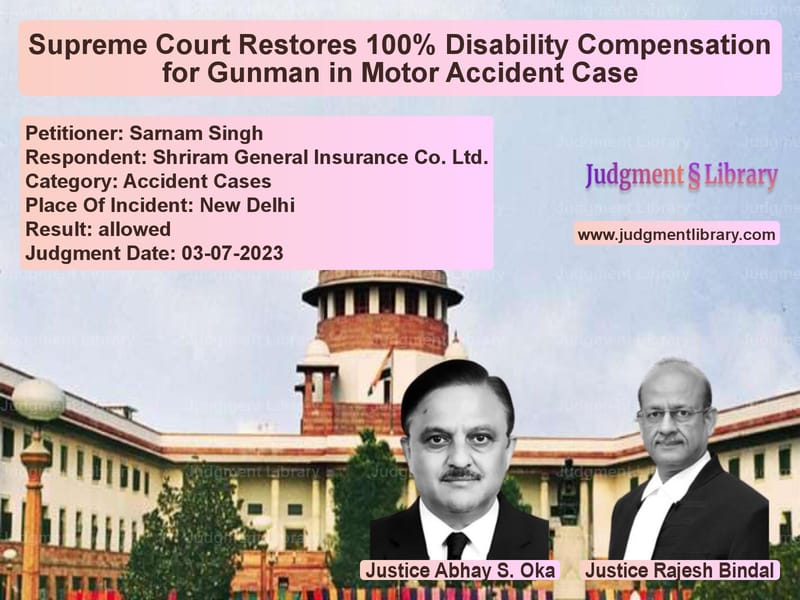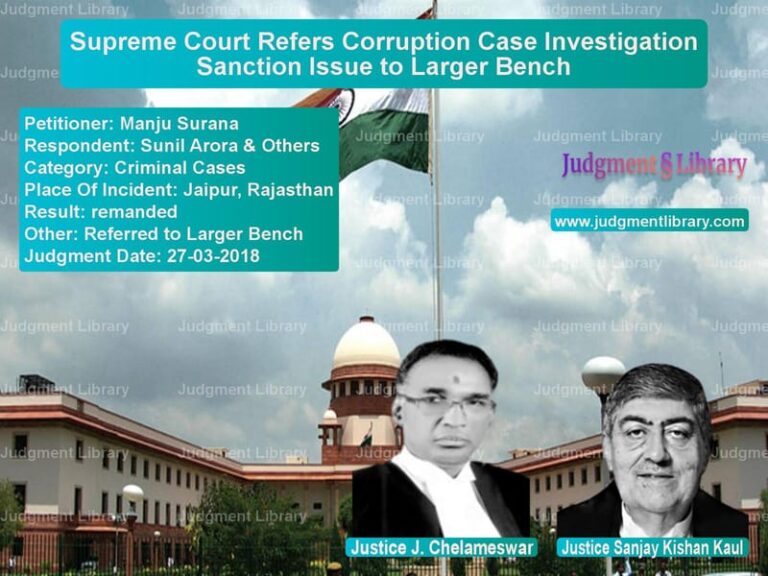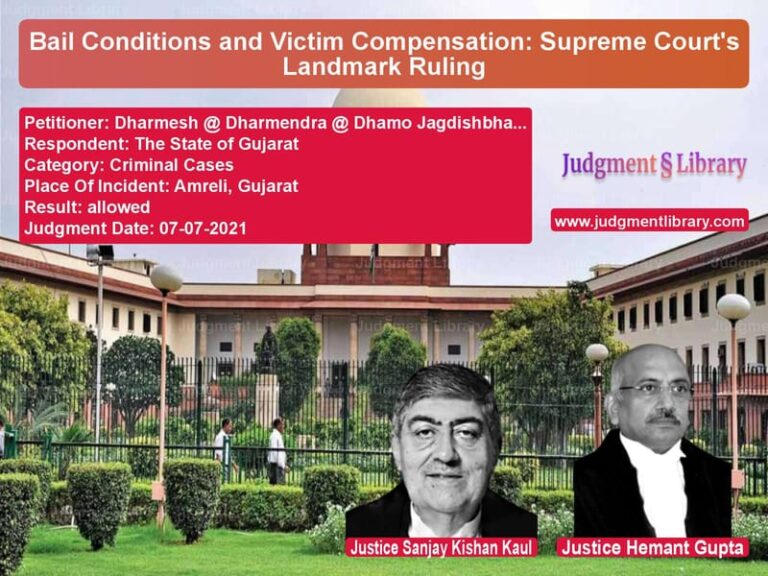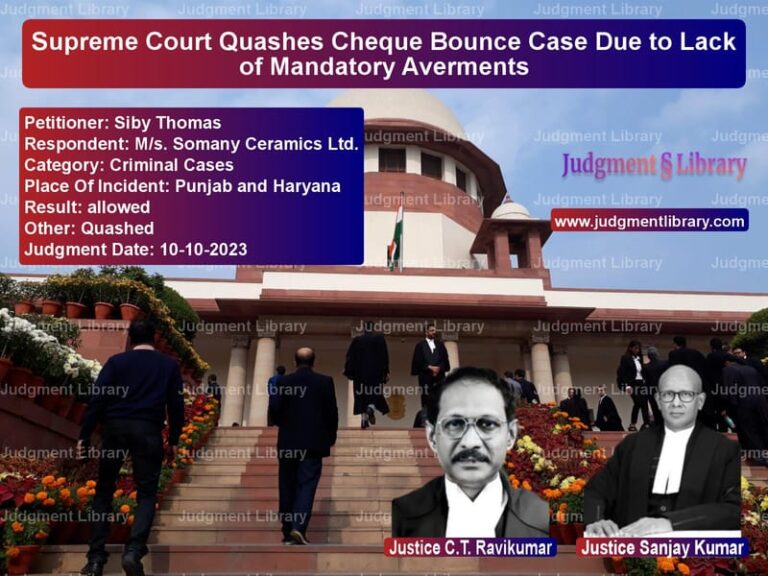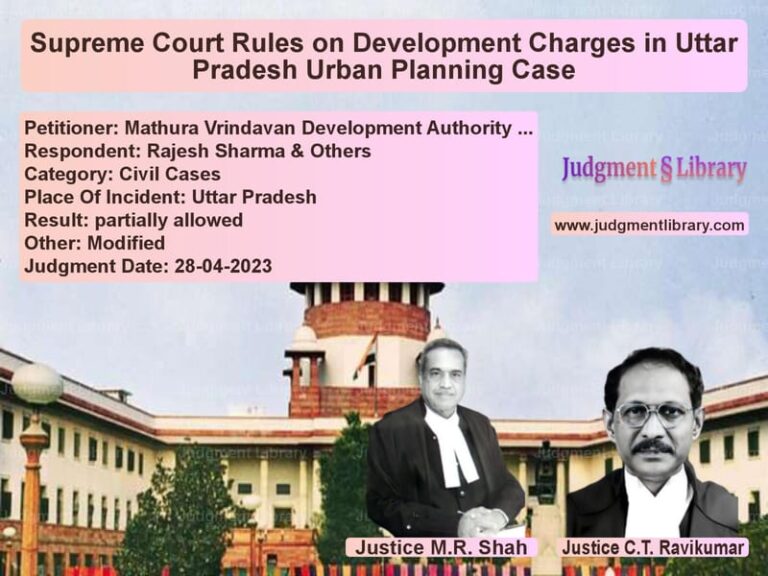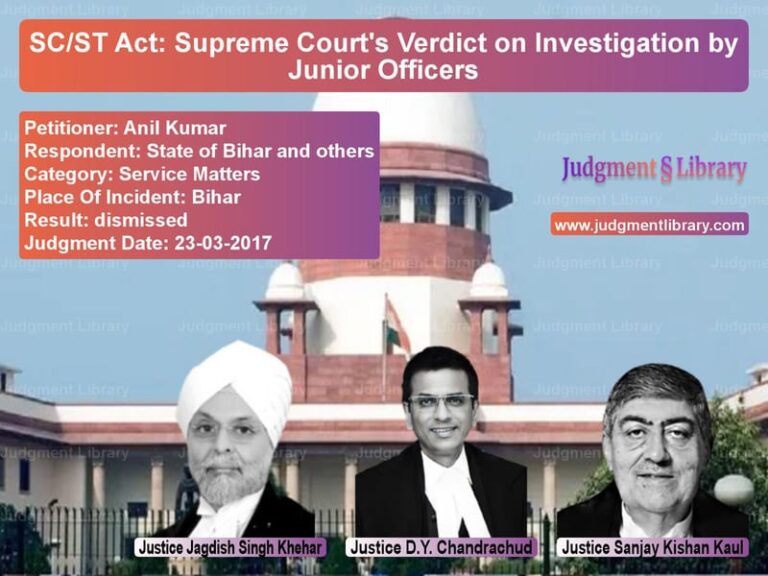Supreme Court Restores 100% Disability Compensation for Gunman in Motor Accident Case
The case of Sarnam Singh v. Shriram General Insurance Co. Ltd. revolves around a compensation claim by a former gunman who suffered 85% disability due to a road accident. The Supreme Court ruled that the High Court had erred in reducing his loss of earning capacity from 100% to 80%, thereby restoring the original compensation awarded by the Motor Accident Claims Tribunal (MACT).
Background of the Case
The appellant, Sarnam Singh, was employed as a gunman at Bharat Hotels Ltd.. On November 24, 2013, he met with a road accident involving a tempo (UP 79T 1948), resulting in severe injuries. His right lower limb was amputated, leading to permanent disability.
Key Developments Leading to Litigation
- November 24, 2013: Sarnam Singh was hospitalized for one month and ten days.
- April 18, 2016: MACT awarded compensation of ₹34,29,800.
- August 25, 2017: The Delhi High Court reduced the compensation to ₹28,43,000 by reducing his functional disability from 100% to 80%.
- July 4, 2023: The Supreme Court restored the 100% disability claim and the original compensation awarded by MACT.
Arguments Before the Supreme Court
Appellant’s Arguments
Sarnam Singh, through his counsel, contended:
- As a gunman, the amputation of his right leg rendered him completely unfit for his job.
- His employer had terminated his service on May 31, 2015, due to his inability to perform his duties.
- The High Court erroneously reduced his functional disability to 80%, disregarding the complete loss of his employment.
- The Tribunal had correctly applied the principles laid down in Mohan Soni v. Ram Avtar Tomar, where a rickshaw puller’s disability was assessed at 90% due to similar circumstances.
Respondent’s Arguments (Shriram General Insurance Co. Ltd.)
The insurance company countered:
- The Tribunal’s assessment of compensation was excessive.
- The disability certificate issued by Madan Mohan Malviya Hospital assessed his permanent disability at 85%, and the compensation should reflect that.
- The High Court had correctly adjusted the loss of earning capacity to 80%.
Supreme Court’s Analysis and Judgment
A bench comprising Justices Abhay S. Oka and Rajesh Bindal ruled in favor of the appellant, emphasizing that functional disability should be assessed concerning the nature of employment.
Key Observations of the Court
1. Functional Disability Must Reflect Job Requirements
“It is not a matter of dispute that a person with his right leg amputated cannot perform the duty of a gunman. This is his functional disability.”
The Court stressed that disability should not be assessed in isolation but should be linked to the job’s requirements.
2. The High Court Erred in Reducing Compensation
“The High Court was in error in reducing the loss of earning capacity to 80%, despite a judgment of this Court available on the issue.”
The Court ruled that the High Court should have followed its own precedent in assessing disability concerning job function.
3. Precedent from Mohan Soni’s Case Applies
“Any physical disability resulting from an accident has to be judged with reference to the nature of the work being performed by the person who suffered disability.”
The Supreme Court reaffirmed that for physically demanding jobs, even partial disability could translate to complete functional disability.
4. The Tribunal’s Award Was Correct
“The Tribunal was right in assessing the loss of earning capacity of the appellant at 100% and assessing the compensation accordingly.”
The Court upheld the original ₹34,29,800 compensation.
Final Verdict
The Supreme Court restored the Tribunal’s compensation order, stating:
“The appeal filed by the appellant is allowed. The impugned order passed by the High Court is set aside, and the award passed by the Tribunal is restored.”
The insurance company must now pay the full compensation of ₹34,29,800.
Impact of the Judgment
This ruling has several legal implications:
- Strengthens compensation claims: Courts must consider employment loss while assessing disability.
- Ensures fair compensation: Even 85% disability can translate to 100% job loss in certain professions.
- Clarifies insurance liability: Insurers cannot challenge disability claims without considering the job function.
- Reinforces precedent: Similar cases must follow the Mohan Soni ruling.
Conclusion
The Supreme Court’s decision in Sarnam Singh v. Shriram General Insurance ensures just compensation for accident victims whose disabilities render them unfit for their professions. The ruling reinforces that courts must assess loss of earning capacity based on the claimant’s specific job requirements.
Petitioner Name: Sarnam Singh.Respondent Name: Shriram General Insurance Co. Ltd..Judgment By: Justice Abhay S. Oka, Justice Rajesh Bindal.Place Of Incident: New Delhi.Judgment Date: 03-07-2023.
Don’t miss out on the full details! Download the complete judgment in PDF format below and gain valuable insights instantly!
Download Judgment: sarnam-singh-vs-shriram-general-insu-supreme-court-of-india-judgment-dated-03-07-2023.pdf
Directly Download Judgment: Directly download this Judgment
See all petitions in Compensation Disputes
See all petitions in Motor Vehicle Act
See all petitions in Negligence Claims
See all petitions in Judgment by Abhay S. Oka
See all petitions in Judgment by Rajesh Bindal
See all petitions in allowed
See all petitions in supreme court of India judgments July 2023
See all petitions in 2023 judgments
See all posts in Accident Cases Category
See all allowed petitions in Accident Cases Category
See all Dismissed petitions in Accident Cases Category
See all partially allowed petitions in Accident Cases Category

